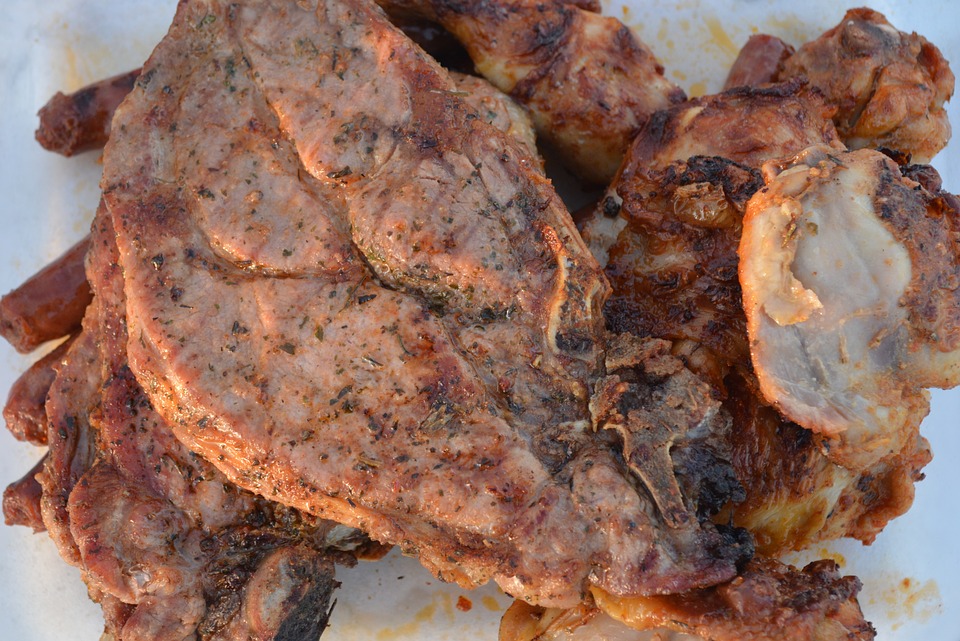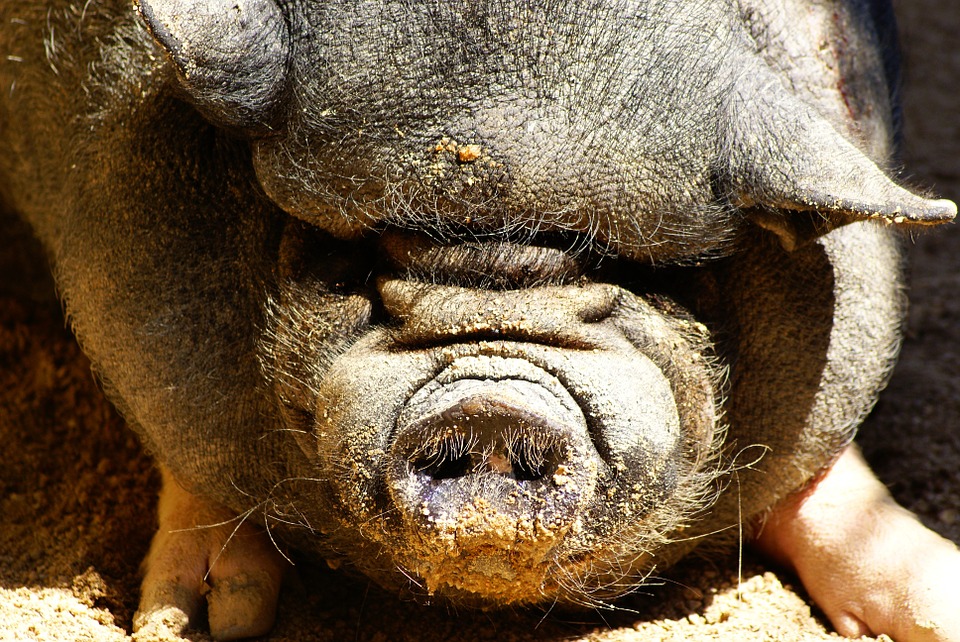The question of whether cats can safely consume pork is a common one among cat owners. This article aims to provide a comprehensive understanding of the potential risks and benefits, exploring the nutritional aspects, digestive implications, and alternative dietary options for feline companions.
Part 1: Understanding the Nutritional Profile of Pork

1.1. The Nutritional Makeup of Pork: A Closer Look
Pork is a versatile protein source that contributes a variety of nutrients to the human diet. It boasts a significant amount of protein, essential for muscle growth and repair, as well as crucial B vitamins such as thiamin, riboflavin, niacin, and vitamin B12. These vitamins are vital for energy metabolism, cell function, and overall health. Pork also contains a good amount of iron, which is essential for carrying oxygen throughout the body.
1.2. Beyond Protein: Essential Minerals in Pork
In addition to its protein and B vitamin content, pork provides important minerals like zinc, selenium, and phosphorus. Zinc plays a crucial role in immune function, wound healing, and cell growth, while selenium is a powerful antioxidant that protects against cellular damage. Phosphorus, along with calcium, is vital for bone health and energy production.
Part 2: The Feline Digestive System: A Carnivore's Design

2.1. Obligate Carnivores: Cats and Their Specialized Digestion
Cats are classified as obligate carnivores, meaning their digestive systems are specifically adapted to efficiently process and absorb nutrients from animal-based foods. Their digestive tracts are relatively short compared to omnivores or herbivores, lacking the enzymes necessary to fully digest plant-based carbohydrates.
2.2. Digesting Meat: A Cat's Evolutionary Advantage
Cats have evolved to have strong stomach acids and enzymes that effectively break down the protein and fat found in meat. This allows them to absorb the essential nutrients they need to thrive. However, this specialized digestive system comes with limitations when it comes to digesting non-meat substances.
Part 3: Pork and Cat Digestion: A Mismatch?
3.1. The Fat Factor: A Potential Challenge for Cats
While pork is an animal-based protein, its higher fat content compared to typical feline prey can present challenges for cats' digestive systems. This higher fat content can lead to digestive issues such as diarrhoea and vomiting.
3.2. Diarrhoea and Vomiting: Signs of Indigestion
Diarrhoea in cats after consuming pork is often a consequence of the body struggling to digest and absorb the excess fat. Vomiting can also occur as a reaction to the discomfort and indigestion caused by the high-fat content.
3.3. Pancreatitis: A Serious Risk
In severe cases, consuming large quantities of pork can trigger pancreatitis, a painful inflammation of the pancreas. Pancreatitis can be life-threatening and requires immediate veterinary attention.
Part 4: Beyond Pork: Essential Nutrients for Feline Health
4.1. Protein Power: Building Blocks for Cats
Cats require a high-protein diet to support their muscle growth, tissue repair, and overall health. This protein should ideally come from animal-based sources, as cats are designed to process animal protein most effectively.
4.2. Fat: Essential for Energy and Health
While excessive fat can be detrimental, cats still need a moderate amount of fat in their diet for energy, insulation, and absorption of fat-soluble vitamins like vitamin A, D, E, and K.
4.3. Vitamin and Mineral Essentials: Supporting Overall Health
Cats require a variety of vitamins and minerals to support their immune system, bone health, vision, and other critical functions. These nutrients are often found in animal-based sources or can be supplemented through commercially available cat foods.
Part 5: Dietary Choices for Cats: Alternatives to Pork
5.1. The Power of Commercially Available Cat Food: Balanced Nutrition
Commercially available cat food is formulated to provide cats with a complete and balanced diet, tailored to their specific nutritional needs. These formulas typically contain high-quality animal-based protein sources, appropriate fat levels, and essential vitamins and minerals.
5.2. Home-Prepared Diets: A DIY Approach with Professional Guidance
Home-prepared diets for cats can be a viable option, but it's crucial to consult with a veterinarian to ensure a proper balance of nutrients. These diets should include lean meats like chicken, turkey, beef, and fish, as well as essential fatty acids from sources like fish oil or flaxseed oil.
5.3. Raw Food Diets: A Natural Choice with Careful Consideration
Raw food diets can provide a natural and nutrient-rich option for cats. However, it's essential to consult with a veterinarian and ensure the food is properly sourced and handled to minimize the risk of contamination.
Part 6: Recognizing Potential Health Issues in Cats
6.1. Changes in Behaviour and Physical Appearance: Red Flags
It's important to be attentive to any changes in your cat's behaviour or physical appearance, as these can indicate potential health issues. These changes might include:
- Loss of appetite
- Weight loss or gain
- Diarrhoea or constipation
- Vomiting
- Lethargy
- Increased thirst
- Changes in coat condition
- Difficulty breathing
6.2. Seeking Veterinary Attention: When to Act Promptly
If you notice any of these symptoms in your cat, it's essential to contact your veterinarian promptly. Early diagnosis and treatment can significantly improve your cat's chances of recovery.
Part 7: Importance of Consultation: Seeking Professional Guidance
7.1. The Veterinarian's Role: Tailoring Diets to Individual Needs
Always consult with your veterinarian before introducing any new foods, including pork, to your cat's diet. They can provide personalized advice based on your cat's age, breed, activity level, and health history.
7.2. Factors to Consider: Creating a Personalized Dietary Plan
Veterinarians can help you develop a suitable dietary plan for your cat, taking into account factors such as:
- Age
- Breed
- Activity level
- Medical conditions
- Weight
Part 8: FAQs: Addressing Common Queries
8.1. Can I Feed My Cat Pork Occasionally?
While occasional small amounts of pork might not cause immediate harm, it's generally not recommended for regular consumption. Consult with your veterinarian to determine the appropriate frequency and quantity if you choose to offer pork to your cat.
8.2. Is Cooked Pork Safer Than Raw Pork for Cats?
Cooking pork can kill harmful bacteria, but it does not eliminate the risks associated with its high fat content. Cooked pork is still not recommended for cats, and raw pork is even more dangerous due to the potential for contamination.
8.3. What If My Cat Eats Pork Accidentally?
If your cat accidentally consumes a small amount of pork, monitor their behaviour closely for any signs of illness. Contact your veterinarian immediately if you notice any unusual symptoms.
8.4. Are There Any Safe Pork Products for Cats?
While some cat food brands may contain pork as a minor ingredient, it's important to ensure it's a small percentage and not the primary source of protein. Choose brands that prioritize high-quality animal-based protein sources and are formulated to meet feline nutritional needs.
8.5. Can I Feed My Cat Pork Bones?
Pork bones are extremely dangerous for cats. They splinter easily, posing a choking hazard and potentially causing internal injuries or even death. Provide your cat with safe chew toys instead.
8.6. What Should I Feed My Cat Instead of Pork?
Cats thrive on a diet rich in high-quality animal-based protein sources, such as chicken, turkey, beef, fish, and lamb. Opt for lean meats and avoid feeding fatty cuts. Consult with your veterinarian for personalized dietary recommendations.
8.7. Can Cats Eat Pork Belly?
Pork belly is particularly high in fat, making it even more dangerous for cats than other pork cuts. It should be strictly avoided.
8.8. What About Pork Sausage?
Pork sausages often contain high levels of fat and seasonings that are not suitable for cats. They should be avoided, as they can cause digestive issues, pancreatitis, and other health problems.
8.9. Can Cats Eat Pork Ribs?
Pork ribs, like other pork bones, pose a serious choking hazard and can cause internal injuries. They should be avoided.
8.10. Can Cats Eat Pork Bacon?
Pork bacon is extremely high in fat and sodium, making it extremely unhealthy and potentially dangerous for cats. It should be avoided at all costs.
Everyone is watching
-

Are Cat Ribs Flexible? Understanding Their Anatomy
CATS & KITTENSThis article delves into the fascinating world of feline anatomy, exploring the flexibility of cat ribs and ho...
-

Can Cats Eat Bananas? (Everything You Need to Know)
CATS & KITTENSThis article dives into the intriguing question of whether cats can safely enjoy the sweet, yellow fruit, bana...
-

Cat Lifespan: How Long Do Cats Live?
CATS & KITTENSThis comprehensive guide explores the factors influencing the lifespan of our feline companions, providing ins...
-

Can Cats Get COVID-19? What You Need to Know
CATS & KITTENSThis article will delve into the fascinating world of feline COVID-19 susceptibility. We'll explore whether ca...
-

Can Cats Eat Eggs? A Complete Guide to Egg Safety for Your Feline Friend
CATS & KITTENSWhen it comes to treating our furry companions, we all want to ensure we're doing what's best for them. Eggs...
